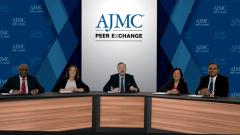
Financial Barriers Impeding Optimal Heart Failure Treatment
Financial considerations associated with heart failure management are dissected.
Episodes in this series

This is a video synopsis/summary of a panel discussion involving Robert Groves, MD; Eugene E. Wright Jr, MD; Nancy Albert, PhD, CCNS, CCRN, CHFN, NE-BC, FAHA, FCCM, FHFSA, FAAN; Nihar Desai, MD, MPH; and Kelly Marie Axsom, MD. The panel highlights cost as a major barrier to heart failure care, which affects access to medications and effective treatment. Even patients with insurance struggle with copays. Albert notes her center uses pharmacists to assist with prior authorizations and patient assistance programs for free medications, but this requires extensive time and resources. Individual providers cannot reasonably handle this alone. Wright stresses that creative solutions are possible with proper infrastructure and support teams. Desai discusses an analysis finding heart failure quadruple therapy costs Medicare beneficiaries more than $2200 out of pocket, which is likely unaffordable for many. Despite reducing hospitalizations and total costs, high out-of-pocket costs limit access to life-changing therapies. Policy changes are needed, such as the Inflation Reduction Act’s provisions for some cardiovascular medications. In summary, the panel emphasizes that addressing cost barriers will require both system-level changes and support for individual provider efforts to ensure evidence-based heart failure care is financially accessible.
Video synopsis is AI-generated and reviewed by AJMC editorial staff.
Newsletter
Stay ahead of policy, cost, and value—subscribe to AJMC for expert insights at the intersection of clinical care and health economics.










